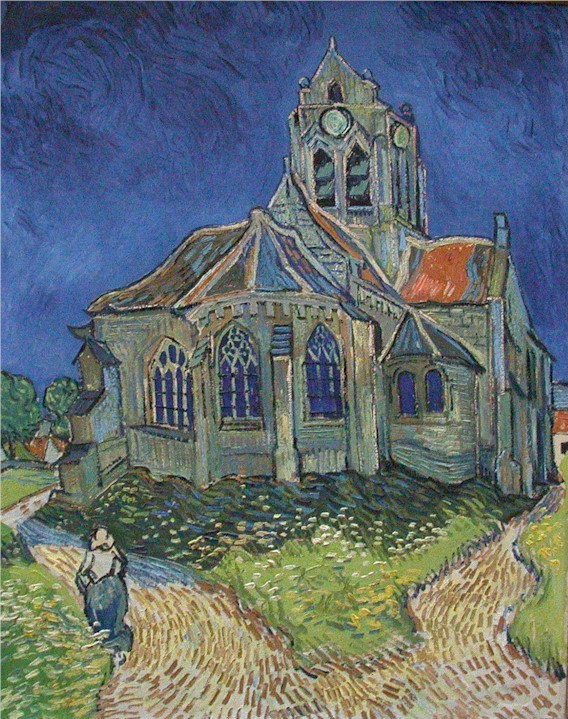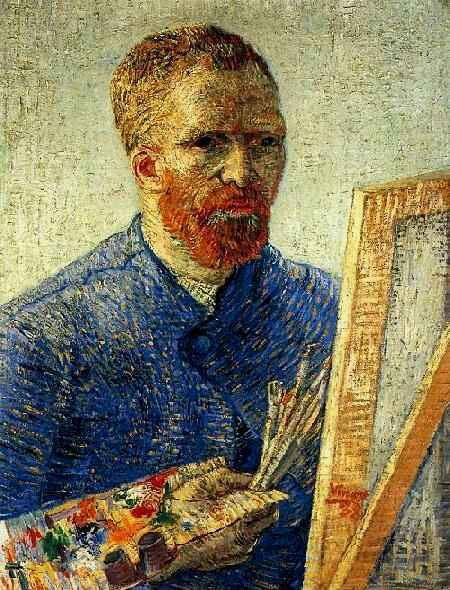
20th sunday after pentecost
today's lectionary readings
Isaiah 53:4-12
Psalm 91:9-16
Hebrews 5:1-10
Mark 10:35-45
today's bach cantatas
bwv 48, "o wretched man that i am"
bwv 5, "whither shall i flee?"
bvw 56, "gladly shall i bear the cross"
today's van gogh
the church at auvers, 1890
today's good news
one of the great leaders of europe over the past quarter century has been václav havel, who emerged at the end of the cold war and became president of czechoslovakia. havel, a writer and playwright, had fought for peace and freedom many years before the Soviet Union fell, suffering constant government harassment and multiple imprisonments because of his writings and work as a political dissident. ironically, this man who had been under the power of a repressive regime, ultimately was voted into a place of power, where during the 1990s he helped lead czechoslovakia into life as a free nation.
upon receiving one of his many awards as a significant force for peace and freedom, havel made a speech about the temptations that come with holding a position of political power. here is part of what he said that day:
power, said václav havel, is pursued by those with high ideals, who want to make a difference in the world. they are also driven by the natural need to be affirmed and feel important. and third, they seek power because it offers attractive and comfortable side-benefits.Why is it that people long for political power, and why, when they have achieved it, are they so reluctant to give it up?
In the first place, people are driven into politics by ideas about a better way to organize society, by faith in certain values or ideals, be they impeccable or dubious, and the irresistible desire to fight for those ideas and turn them into reality.
In the second place, they are probably motivated by the natural longing every human being has for self-affirmation. Is it possible to imagine a more attractive way to affirm your own existence and its importance than that offered by political power? In essence, it gives you a tremendous opportunity to leave your mark, in the broadest sense, on your surroundings, to shape the world around you in your own image, to enjoy the respect that every political office almost automatically bestows upon the one who holds it.
In the third place, many people long for political power and are so reluctant to part with it because of the wide range of perks that are a necessary part of political life -- even under the most democratic of conditions.
in today's gospel lesson, two of jesus' disciples ask if they might be granted positions of power in his coming kingdom. i'm sure they had many good motivations in asking him this.
- first, they were right in understanding what was happening through jesus. god's glorious kingdom was dawning! jesus was the messiah, the promised one who would restore the splendor of david's reign over israel and the world. the long-awaited messianic era of righteousness and peace was about to be revealed, and jesus would be at the center of it all, on the throne.
- second, they wanted to serve and represent him in this kingdom. when something so wonderful is about to take place, who wouldn't want to be an important part of it?
václav havel went on to say this about our motivations in seeking power:
I have never met a politician who could admit to the world, or even to himself, that he was running for office only because he wanted to affirm his own importance, or because he wanted to enjoy the perks that come with political power. On the contrary, we all repeat over and over that we care not about power as such but about certain general values. We say it is only our sense of responsibility to the community that compels us to take upon ourselves the burden of public office. At times, only God Himself knows whether that is true, or simply a more palatable way of justifying to the world and ourselves our longing for power, and our need to affirm, through our power and its reach, that we exist in a truly valid and respectable way.the desire for power may be, for christians, the most misunderstood temptation.
i have watched pastors function as dictators over their congregations, without a clue that their original ideals have become so corrupted that they now brazenly lord it over people. i've seen lay people seize power and hold congregations hostage to their opinions and preferences. i've watched as national evangelical leaders get sucked into the "culture war" mentality and learn to play the game with all the spin and manipulation of the most hard shell, hardball politicians. i've seen brothers and sisters bully one another over the most insignificant issues.
and most of all, i know how much i myself want to be in control, to feel important, to get the cushy assignments, to be seen with the right people, to have others do the grunt work while i enjoy the banquet.
most of the time, we can somehow rationalize what we're doing, claiming it's necessary to achieve a higher purpose. however, i believe that it is the rare person who can successfully navigate the rapids of power.
jesus did, because his modus operandi was sacrifice. from cradle to cross, he laid down his life for us. he came not to be served but to serve. to give his life. to provide a ransom by his own death for those enslaved and imprisoned.
our glory only comes as we die with him. doing so will teach us to treat even the smallest forms of power with extreme caution.








No comments:
Post a Comment